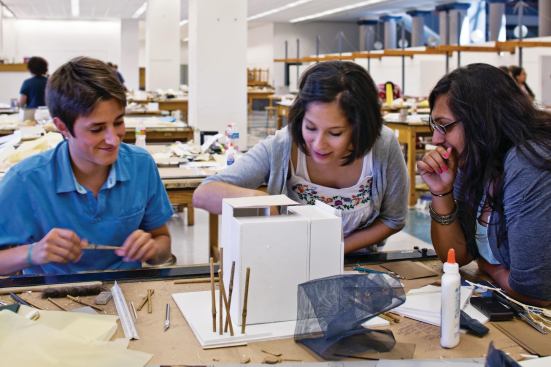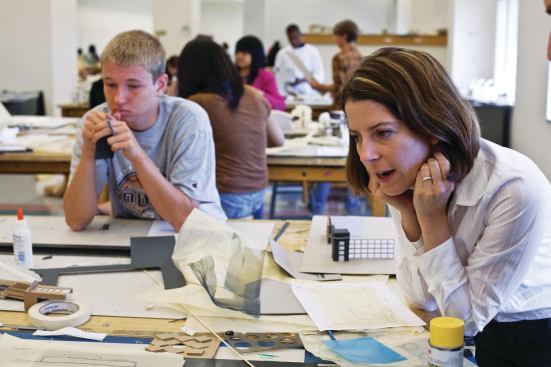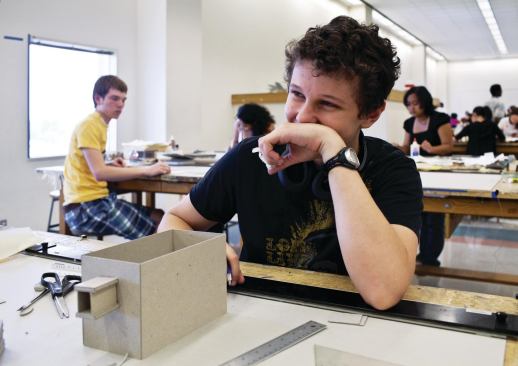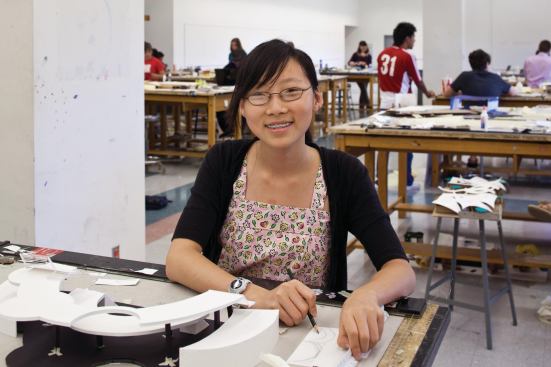Matthew Monteith
But how does it work? Alan Garcia with teaching assistants Rebec…
CAREER DISCOVERY
Harvard University Graduate School of Design
On a gray wednesday in July, the “trays” of Gund Hall—five open, tiered floors of studios that step up to a glass roof—are busy yet quiet, thanks to the ubiquitous earbuds of the iPod generation. Gund Hall is home to Harvard University’s Graduate School of Design (GSD), but these students are not enrolled at Harvard. They’re here for six weeks to take part in Career Discovery, which, at 31 years old, is the grandaddy of collegiate summer programs in design.
A few hours earlier, the students had filed into Piper Auditorium for a lecture by Alex Krieger, interim chair of Harvard’s Department of Urban Planning and Design. Now they are up on the trays, in their cubbyholes, intent on the week’s project: rethinking Government Center Plaza, the much-maligned area of downtown Boston anchored by the Brutalist Boston City Hall. As they sketch, pore over maps, and assemble precarious models, the participants appear no different from their year-round GSD counterparts. Until you notice the age range: this year, Career Disco (as it’s known) has students as young as 18 and as old as 75, according to the program’s director, Jeffrey Klug.
Klug, an architect, has been running Career Discovery for 11 years. He took the job because it seemed like a nice complement to his practice, then he fell in love with it. “We have an incredible student population, and they teach each other a fantastic amount,” he says over coffee in the GSD’s small cafeteria. Not only is the program a relatively low-cost, low-risk opportunity for the curious to try out design school (as opposed to plunking down a semester’s tuition and hoping for the best), it’s great for the two-dozen-plus instructors in the program, all GSD graduates or final-year students who gain valuable teaching experience. Of the 243 Career Discovery participants this year, about one-fourth probably will decide to go to graduate school for a design discipline (at Harvard or elsewhere); the rest who don’t may prove the most effective ambassadors for the program, as they carry what they learned back to their professional worlds of finance, medicine, IT, and education, among others.
Although Career Discovery was initially directed at rising college juniors and seniors, today only 30 percent of participants fit that profile. Among the other 70 percent are many potential career-changers such as Jessica Morris, a high-school sports coach who lives on Martha’s Vineyard. Trained as a painter at the Rhode Island School of Design, Morris is considering applying to graduate school for architecture, so Career Discovery will be a crucial portfolio-builder for her (as it is for many others).
This afternoon, she assembles small pieces of blue foam into a model of a proposed live-work artists’ building for Government Center Plaza, using a piece of yellow string to experiment with circulation paths. Is she worried about embarking on a career as an architect in the teeth of a recession? “Being an architect in a bad economy is maybe a better position than being a painter in a bad economy,” she says. “It’s all relative.”
A few cubbyholes over sits Constantine Lemos of Athens, Greece, a rising third-year architecture student at Oxford Brookes University in Oxford,England. For Lemos, Career Discovery is a chance to sample an entirely new education system. “I wanted to see how the American system works, and try to compare it with the British system, and think about my future,” he says. On the strength of Career Discovery, the U.S. is winning out. Instruction here is “more down-to-earth, more real,” he says. “Which I really like.” —Amanda Kolson Hurley
PROGRAM DETAILS
Length: six weeks
Concentrations: architecture, landscape architecture, urban planning, urban design
Tuition: $2,760 (2010 rate)
Housing: available in Harvard Law School dormitories at an additional cost
gsd.harvard.edu












